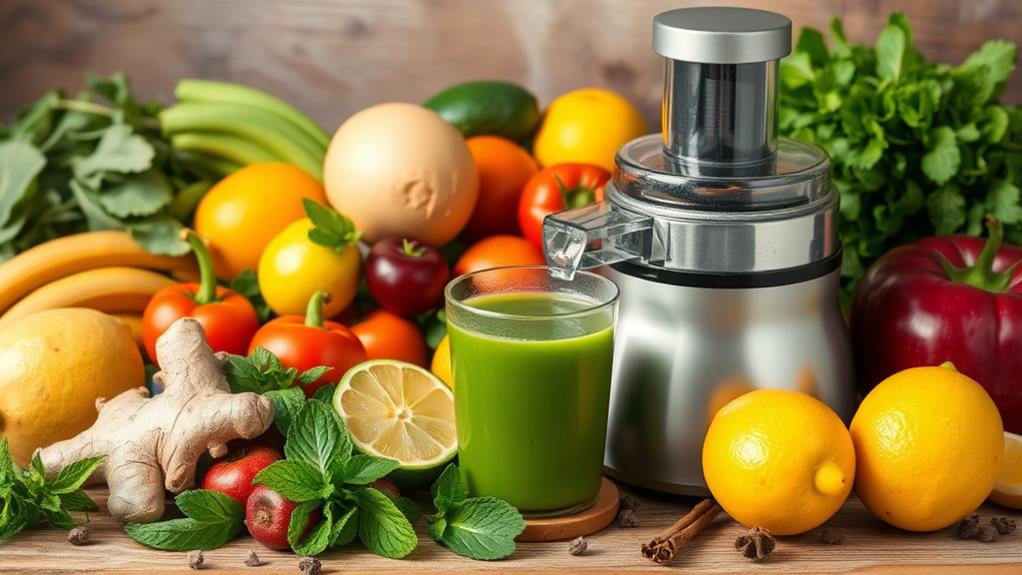If you've ever experienced the discomfort of a sour stomach after a meal, you know how it can disrupt your day. Understanding the causes and symptoms is essential for finding effective relief. You might be surprised to learn that simple remedies like ginger or chamomile tea can soothe your stomach, while certain prevention tips can help you avoid future discomfort. Curious about how to incorporate these methods into your routine and what other remedies might work for you? The insights ahead could change how you approach your digestive health.
Understanding Sour Stomach

Sour stomach, which you might know as indigestion, often strikes after a heavy meal or when you indulge in spicy or fatty foods. It can leave you feeling bloated, burpy, and even a bit queasy. You might taste that sourness in your mouth, which is your stomach acid trying to remind you it's there!
This discomfort can be caused by overeating or stress, and sometimes by underlying issues like GERD or gastritis.
When you experience abdominal discomfort, it's your body's way of saying, "Hey, something's not right!" To help prevent dehydration, make sure you're sipping on water throughout the day.
You can also try some home remedies to ease your sour stomach. Ginger and peppermint are great choices to add to your meals, and they can work wonders. Eating smaller meals can also do the trick, as it lightens the load on your stomach!
Common Causes of Sour Stomach
After a big meal or when you're feeling stressed, you might find yourself grappling with a sour stomach. This discomfort often results from overeating, where your stomach just can't handle the excess food, leading to acid reflux.
You know those spicy foods you love? They can also be culprits, irritating your stomach lining and making things worse.
Stress and anxiety play a sneaky role, too. When you're anxious, your body changes how it digests food, which can crank up stomach acidity.
Plus, those carbonated drinks and alcoholic beverages? They can make your sour stomach feel even worse, causing bloating and discomfort.
If you're dealing with ongoing issues, it could be a sign of gastritis or other gastrointestinal problems, like GERD. It's important to pay attention to what triggers your symptoms.
Recognizing Symptoms

Often, you might notice several symptoms accompanying a sour stomach that signal digestive distress. These can include abdominal discomfort, frequent burping, and a sour taste in your mouth. Nausea and heartburn are also common, making you feel like you swallowed a volcano!
If you ever experience acid reflux, where stomach acid creeps back up, it's likely linked to your sour stomach.
Sometimes, certain trigger foods—like spicy or fatty meals—can make things worse, especially if you've overeaten or are feeling stressed. Your appetite might even change, leading to food aversions that can leave you scratching your head, wondering why you suddenly can't stand the sight of your favorite dish.
If you notice severe symptoms, like persistent nausea or regurgitation, don't hesitate to consult a healthcare provider. It's crucial to rule out any underlying conditions that might be affecting your digestive health.
Dietary Recommendations
To help manage a sour stomach, it's essential to focus on your dietary choices. Start by adding ginger and peppermint to your meals. They're great at easing nausea and helping your stomach feel better.
Following a BRAT diet—bananas, rice, applesauce, and toast—can also be a lifesaver. These foods are gentle on your stomach and help settle things down.
Don't forget about staying hydrated! Drink plenty of non-carbonated beverages to keep your body happy. Including probiotics, like yogurt, can support your gut health and might help prevent future sour stomach episodes.
Watch out for trigger foods! Spicy, fatty, and acidic items can make your symptoms worse, so it's best to skip those.
And instead of three big meals, try eating smaller meals more frequently. This can prevent your stomach from feeling overloaded and reduce discomfort.
Apple Cider Vinegar Remedy

Apple cider vinegar (ACV) is a powerful natural remedy that many people turn to for relief from a sour stomach. If you're struggling with stomach issues, ACV might just be your new best friend! It helps neutralize excess stomach acid, which can ease that uncomfortable feeling.
To give it a try, mix 1 tablespoon of apple cider vinegar with honey in a glass of water. Drink this concoction before meals, and you might notice a big difference in your discomfort.
The magic behind ACV lies in its acetic acid. This natural ingredient can aid in digestion and even promote the growth of good bacteria in your gut.
Plus, drinking diluted apple cider vinegar may help keep your blood sugar levels steady, which can reduce those pesky hunger pangs that sometimes lead to nausea.
Just remember, it's super important to avoid undiluted apple cider vinegar. It can be harsh on your esophagus and tooth enamel, and nobody wants that!
Baking Soda Solution
When you're dealing with a sour stomach, baking soda can be a quick and effective solution. This handy kitchen staple, also known as sodium bicarbonate, neutralizes excess stomach acid, giving you relief from that uncomfortable indigestion.
To use it, just mix 1/2 teaspoon of baking soda in 1/2 glass of water, stir it up, and drink. It's that simple!
However, be careful if you have high blood pressure or are on a sodium-restricted diet. Too much baking soda can raise your sodium levels, which isn't good for your health.
Plus, using it long-term isn't recommended. It can lead to electrolyte imbalances and might even make your stomach acid production worse over time. Yikes!
Benefits of Bananas

If baking soda isn't quite your style for soothing a sour stomach, bananas offer a gentle and tasty alternative. These bright yellow fruits aren't only delicious but also great for your stomach troubles. Their low acidity helps calm your stomach, while their high fiber content aids digestion.
When you're feeling queasy, bananas can help relieve nausea and provide a quick energy boost, making them perfect for those moments of digestive distress.
Bananas are rich in potassium, which helps restore your electrolyte balance, especially after you've been sick. Plus, the soluble fiber called pectin in bananas can help regulate your bowel movements, easing both constipation and diarrhea.
So, whether you're feeling a bit off or just want a healthy snack, bananas are a smart choice.
Regularly munching on bananas can also promote gut health, thanks to their probiotic properties. That means they might help keep your digestive system in tip-top shape over time!
Ginger for Relief
Ginger's long-standing reputation as a natural remedy for digestive issues makes it a go-to choice for soothing a sour stomach. This amazing spice, often found in your kitchen, works wonders when you're dealing with nausea and vomiting.
Ginger root contains gingerol and shogaol, which have anti-inflammatory properties that help calm your stomach lining. You might be surprised to learn that studies show ginger can be just as effective as some over-the-counter medications for relieving nausea!
To get the best benefits, you can consume around 1 to 2 grams of ginger each day. Try sipping on ginger tea or munching on raw ginger slices for that digestive relief.
And let's not forget about ginger ale! It's not just a tasty drink; it can help hydrate you when you're feeling under the weather. Whether you're enjoying a slice of ginger root or sipping ginger ale, you're doing your stomach a favor.
Chamomile Tea Benefits

Chamomile tea is a fantastic option for soothing a sour stomach and alleviating digestive discomfort. If you've ever felt bloated or crampy, sipping on some chamomile tea can help soothe the stomach and reduce discomfort. This delightful drink has anti-inflammatory properties that work wonders for your stomach lining, making it easier to manage those pesky symptoms. You might want to try drinking 2-3 cups daily for the best results.
Chamomile tea is also packed with antioxidants, like apigenin, which can calm your digestive tract. If you struggle with acid reflux, this tea might just be your new best friend.
Plus, it promotes relaxation and helps reduce stress—two common triggers for a sour stomach.
Oh, and did I mention it's caffeine-free? That means you can enjoy your chamomile tea without worrying about those jittery feelings that come with caffeinated drinks.
Cinnamon and Green Tea
For those looking for additional remedies to ease a sour stomach, cinnamon and green tea are excellent options to contemplate.
Cinnamon isn't just a tasty spice; it's packed with anti-inflammatory properties that can help soothe your digestive tract. Just mix one teaspoon of cinnamon in warm water, and you might find relief from that pesky sour stomach feeling. It's like a warm hug for your belly!
On the other hand, green tea is rich in antioxidants, making it a superstar for gut health. Drinking 2-3 cups a day can aid digestion and help calm your sour stomach, but don't add milk—this could upset your tummy even more.
Plus, both cinnamon and green tea have mild anti-nausea effects, which can be a lifesaver when you're feeling queasy.
Regularly enjoying cinnamon can also help regulate blood sugar levels, which means less hunger-induced nausea. And, let's be honest, nobody likes that!
Effective Juices for Relief

When your stomach feels sour, reaching for a revitalizing juice can be a game changer. Effective juices can really help soothe your discomfort and bring relief. For instance, drinking a cup of apple juice twice daily works wonders. Its gentle nature and high pectin content can ease your digestive troubles.
Lemon juice is another great option. Mixing two tablespoons in warm water can neutralize stomach acid and get your digestion back on track.
If you want to pamper your stomach lining, consider aloe vera juice. It's known to reduce inflammation and irritation, making it a soothing choice.
Coconut water's hydrating properties can also help. It replenishes lost electrolytes during digestive distress and can ease nausea.
Prevention Tips for Sour Stomach
Revitalizing juices can provide immediate relief from a sour stomach, but preventing the discomfort in the first place is key. To keep your tummy happy, start by eating smaller, more frequent meals. This helps reduce pressure on your stomach, making digestion smoother and preventing sour stomach symptoms.
Staying hydrated is also super important! Drink non-carbonated beverages like water or herbal teas to support your digestive health.
You'll want to be on the lookout for trigger foods, too. Spicy, fatty, and acidic items can wreak havoc on your stomach, so try to avoid them.
Another tip is to maintain a regular meal schedule and steer clear of late-night eating. This helps prevent discomfort and acid reflux while you sleep, which is a real win!
Don't forget about ginger and peppermint! Adding these to your diet can soothe your stomach naturally. They're like your tummy's best friends, helping to keep sour stomach symptoms at bay.
With these simple tips, you can enjoy your meals without worrying about those pesky stomach troubles!




